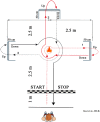Motor and cognitive growth following a Football Training Program
- PMID: 26579014
- PMCID: PMC4621303
- DOI: 10.3389/fpsyg.2015.01627
Motor and cognitive growth following a Football Training Program
Abstract
Motor and cognitive growth in children may be influenced by football practice. Therefore the aim of this study was to assess whether a Football Training Program taken over 6 months would improve motor and cognitive performances in children. Motor skills concerned coordinative skills, running, and explosive legs strength. Cognitive abilities involved visual discrimination times and visual selective attention times. Forty-six children with chronological age of ∼9.10 years, were divided into two groups: Group 1 (n = 24) attended a Football Exercise Program and Group 2 (n = 22) was composed of sedentary children. Their abilities were measured by a battery of tests including motor and cognitive tasks. Football Exercise Program resulted in improved running, coordination, and explosive leg strength performances as well as shorter visual discrimination times in children regularly attending football courses compared with their sedentary peers. On the whole these results support the thesis that the improvement of motor and cognitive abilities is related not only to general physical activity but also to specific ability related to the ball. Football Exercise Programs is assumed to be a "natural and enjoyable tool" to enhance cognitive resources as well as promoting and encouraging the participation in sport activities from early development.
Keywords: Football Exercise Program; children; motor skills; visual discrimination; visual selective attention.
References
LinkOut - more resources
Full Text Sources
Other Literature Sources


